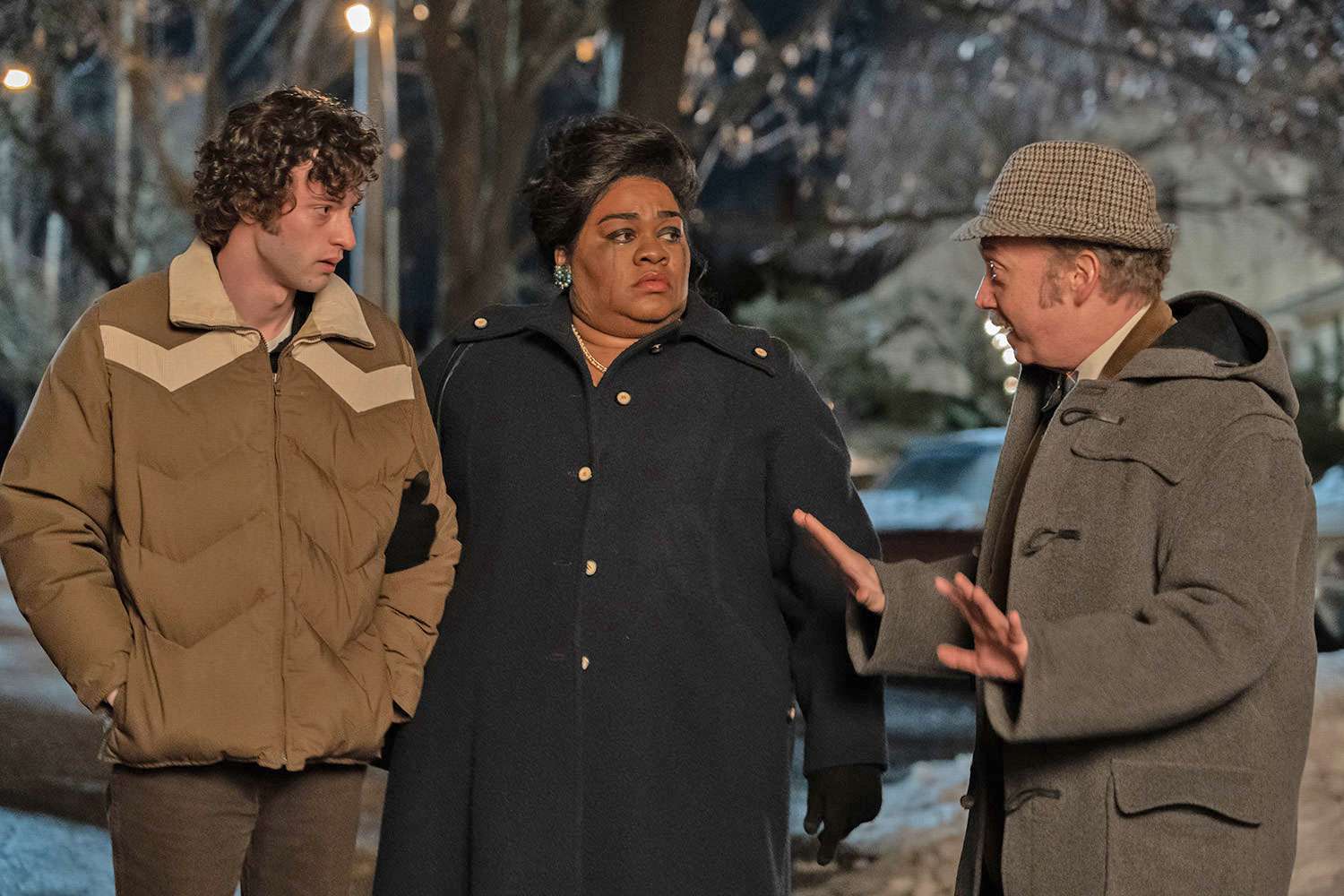Alxander Payne‘s The Holdovers isn’t just set in the 1970s. Every aesthetic and narrative choice aims to evoke the era, and the result is his finest film for a long time, matching Election and Sideways as his very best. From the attention to detail of the period-specific studio logos (even the BBFC ident is from 1970 with John Trevelyan‘s signature) to the loose, character-driven narrative that evoke the likes of Peter Bogdanovich, Hal Ashby, and Robert Altman, it’s soaked in Jim Beam, reeks of cigarettes at the dinner table, and vibrates with class consciousness. It’s also blessed with a triptych of special performances as rich and textured as its 35mm film stock.
Paul Hunham (Paul Giamatti), a cantankerous history teacher at a Massachusetts boarding school is tasked with looking after children who won’t be going home during the Christmas holidays. Over two weeks he shares a series of misadventures with two other lost souls, Angus (newcomer Dominic Sessa) a gifted but troubled 18-year-old perpetually on the cusp of expulsion, and Mary (Da’Vine Joy Randolph), the school’s cook, who has stayed to grieve the loss of her son – a former student at the school – recently killed in Vietnam.
Every moving part of The Holdovers works superbly, but it’s the beautifully-written characters and the actors that inhabit them that will surely receive the most plaudits. Payne loves to present spiky, difficult characters, and then lets the friction between them scrub away the barriers each have erected. He may not have written The Holdovers, David Hemingson is responsible for the screenplay, but it feels every inch a Payne project. It’s no surprise that his Sideways leading man Paul Giamatti is on top form – rarely do an actor and director pairing seem like such a perfect fit. His crotchety teacher feels initially like a variation of wine snob Miles in Sideways, but there’s an extra iron core of principle and courage to Paul that Giamatti slowly teases out. What is surprising is that Giamatti doesn’t dominate. Sessa is unfeasibly good as Angus, the smart kid with a masters from the ‘well-what-have-you-got?’ school of teenage rebellion, evoking frustration, then sympathy, then empathy with insouciant ease.
But perhaps the soul of the film, and embodying much of the social subtext is Da’Vine Joy Randolph’s Mary. She’s been memorable in supporting roles in the like of The Lost City, but she’s given real substance and even her smaller moments are loaded with emotional weight, heartbreak, and quiet determination. She’s an obvious narrative corrective to the cloistered, privileged dueling between Paul and Angus, representing a working class voice and the political backdrop of the early ’70s in the US. Her son was on a scholarship, and died in a conflict that most of his fellow students would get to sidestep because of their social status. Mary is raw with grief and anger, but taps into a deep wellspring of compassion to counsel Angus, and Paul to a lesser extent. It is an extraordinary performance, a complementary performance rather than a supporting one.
The Holdovers is quite simply a film to luxuriate in, warm and sensitive, and made with a relaxed confidence, certain that the viewer will be along for the ride. There are several moments where the film could have ended on an upbeat note or another character revelation, and it would have been completely satisfying. But Payne doesn’t wish to tie things up too neatly and continues to add granular levels of detail. Paul, Angus, and Mary are never allowed to congeal into anything as narratively easy as a surrogate family. They exist as full individuals within this landscape, with all the subtle fluctuations and adjustments anyone would make in response to any incident or set of circumstances.
Hopefully an unorthodox future Christmas classic, The Holdovers is not all mistletoe and cheer and carols round the tree, but there is a sense of goodwill and compassion that resonates with what the season is allegedly about. Still, it’s outlook is welcome at any time of the year. There really isn’t a part that isn’t completely sympatico with the rest. It is a worthy successor to the classics of the New Hollywood era it evokes so well. and an early contender for film of the year
In cinemas nationwide from Fri 19 Jan 2024


Comments